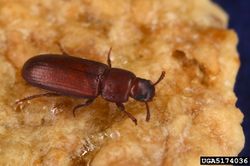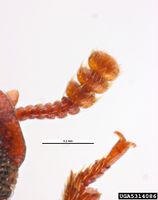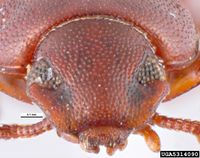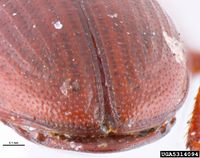Difference between revisions of "Tribolium castaneum"
| (2 intermediate revisions by the same user not shown) | |||
| Line 1: | Line 1: | ||
| − | {{ | + | {{TaxLinks|LnkTribolium}} |
| − | {{ | + | {{LiteratureDBX|{{PAGENAME}}|35|browse,Ccountrylnk,Pproducts,AbenefialsN}} |
[[File:IPMimage5174036.jpg|250px|thumb|''Tribolium castaneum'' (click on image to enlarge it)<br/>Author(s): Peggy Greb, USDA Agricultural Research Service<br/>Source: [http://www.ipmimages.org/browse/detail.cfm?imgnum=5174036 IPM Images]]] | [[File:IPMimage5174036.jpg|250px|thumb|''Tribolium castaneum'' (click on image to enlarge it)<br/>Author(s): Peggy Greb, USDA Agricultural Research Service<br/>Source: [http://www.ipmimages.org/browse/detail.cfm?imgnum=5174036 IPM Images]]] | ||
| − | <font color="#800000">'''''Tribolium castaneum'''''</font> (Herbst, 1797) - (red flour beetle) | + | <font color="#800000">'''''Tribolium castaneum'''''</font> (Herbst, 1797) - (red flour beetle) |
| − | + | ||
| − | The | + | The beetle is a cosmopolitan storage pest of flour mills, grain and other stored products, mainly in warm and tropical regions. It is possibly native to southern Asia. It is frequently introduced into Central Europe, but cannot survive cold temperatures. Mainly broken and damaged grain is attacked. For control, fumigation, controlled atmosphere, high temperatures (60° C) or diatomaceous earth formulations are used. Household goods can be disinfested by freezing them for 24 hours. The life cycle from egg to adult lasts around 1-3 months, depending on the temperature. |
{{VN | {{VN | ||
|en=red flour beetle<br/>rust-red flour beetle | |en=red flour beetle<br/>rust-red flour beetle | ||
| Line 13: | Line 12: | ||
|pt=gorgulho-casatanho-da-farinha<br/>besouro-castanho | |pt=gorgulho-casatanho-da-farinha<br/>besouro-castanho | ||
}} | }} | ||
| + | The adult is around 4 mm long and reddish-brown in colour. It flies readily and can be monitored with pheromone traps. It is closely related to ''[[Tribolium confusum]]'' which has a similar biology and appearance. ''T. castaneum'' can be recognized by the antennae having a 3-segmented club, clearly wider than the rest of the antennae. In ''T. confusum'' the antenna gradually increases to a 4-segmented club. | ||
| + | |||
'''Synonyms:'''<br/> | '''Synonyms:'''<br/> | ||
Colydium castaneum<br/> | Colydium castaneum<br/> | ||
| Line 18: | Line 19: | ||
Tribolium navale | Tribolium navale | ||
| − | For details see the respective page in [ | + | For details see the respective page in [[bugwood:HPIPM:Red_Flour_Beetle|BugwoodWiki]]. |
| + | |||
<gallery widths=200px caption="Other images of Tribolium castaneum (IPM Images - click to enlarge)"> | <gallery widths=200px caption="Other images of Tribolium castaneum (IPM Images - click to enlarge)"> | ||
Latest revision as of 11:17, 25 March 2022
| Literature database |
|---|
| 571 articles sorted by: |
| • year (descending) |
| • research topics |
| • countries/regions |
| • products infested |
| • list of natural enemies |

Author(s): Peggy Greb, USDA Agricultural Research Service
Source: IPM Images
Tribolium castaneum (Herbst, 1797) - (red flour beetle)
The beetle is a cosmopolitan storage pest of flour mills, grain and other stored products, mainly in warm and tropical regions. It is possibly native to southern Asia. It is frequently introduced into Central Europe, but cannot survive cold temperatures. Mainly broken and damaged grain is attacked. For control, fumigation, controlled atmosphere, high temperatures (60° C) or diatomaceous earth formulations are used. Household goods can be disinfested by freezing them for 24 hours. The life cycle from egg to adult lasts around 1-3 months, depending on the temperature.
| Vernacular names | |
|---|---|
| • Deutsch: | Rotbrauner Reismehlkäfer |
| • English: | red flour beetle rust-red flour beetle |
| • Español: | gorgojo rojo de la harina tribolio castaño |
| • Français: | tribolium rouge de la farine petit ver de la farine |
| • Português: | gorgulho-casatanho-da-farinha besouro-castanho |
The adult is around 4 mm long and reddish-brown in colour. It flies readily and can be monitored with pheromone traps. It is closely related to Tribolium confusum which has a similar biology and appearance. T. castaneum can be recognized by the antennae having a 3-segmented club, clearly wider than the rest of the antennae. In T. confusum the antenna gradually increases to a 4-segmented club.
Synonyms:
Colydium castaneum
Tribolium ferrugineum
Tribolium navale
For details see the respective page in BugwoodWiki.
- Other images of Tribolium castaneum (IPM Images - click to enlarge)




